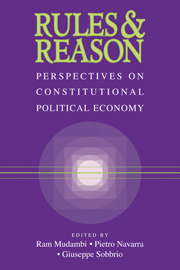Book contents
- Frontmatter
- Contents
- Foreword
- Preface and Acknowledgments
- List of Contributors
- 1 Constitutional Issues in Modern Democracies
- PART I CONSTITUTIONAL THEORY
- PART II ELECTORAL SYSTEMS AND INSTITUTIONS
- 8 Electoral Systems and the Art of Constitutional Engineering: An Inventory of the Main Findings
- 9 Ordinary Elections and Constitutional Arrangements
- 10 The Cost Imposed on Political Coalitions by Constituent Parties: The Case of Italian National Elections
- 11 A Model of Two-Party Campaigns in Pluralistic Elections with Evidence
- PART III CONSTITUTIONAL ISSUES FOR A FEDERAL STATE
- Index
8 - Electoral Systems and the Art of Constitutional Engineering: An Inventory of the Main Findings
Published online by Cambridge University Press: 05 June 2012
- Frontmatter
- Contents
- Foreword
- Preface and Acknowledgments
- List of Contributors
- 1 Constitutional Issues in Modern Democracies
- PART I CONSTITUTIONAL THEORY
- PART II ELECTORAL SYSTEMS AND INSTITUTIONS
- 8 Electoral Systems and the Art of Constitutional Engineering: An Inventory of the Main Findings
- 9 Ordinary Elections and Constitutional Arrangements
- 10 The Cost Imposed on Political Coalitions by Constituent Parties: The Case of Italian National Elections
- 11 A Model of Two-Party Campaigns in Pluralistic Elections with Evidence
- PART III CONSTITUTIONAL ISSUES FOR A FEDERAL STATE
- Index
Summary
Introduction
Electoral system choice, especially the distinction between proportional representation systems (PR) and plurality or majority forms of electoral rules, is widely regarded by political scientists as one of the three fundamental institutional decisions made by a democratic polity (the two other key elements of choice being presidentialism vs. parliamentarism, and unitary vs. federalized government). Choice of electoral systems and other electorally related decisions (e.g., about number of districts, timing of elections, basis for apportioning seats, the nature of the redistricting process, etc.) can be directly linked to a variety of other aspects of the political system such as the number of parties; the degree to which minor parties or minority points of view come to be represented; the degree of descriptive representation by gender, race, religion, and so forth; bias in the way in which some parties have their vote shares translated into set shares relative to other parties with the same vote share; the likelihood of single-party governments; cabinet durability; incentives for localistic or parochialistic attitudes on the part of legislators; electoral responsiveness of the legislature to changes in voter preferences; conflicts between president and legislature; and so on. In sum, electoral systems matter.
Electoral systems are currently a hot topic in political science, with the “third wave” of democratization having produced a large number of new (or “renewed”) democracies. Electoral and other results from these new democracies provide a fertile avenue for new research, especially since the number of electoral system variants available for study has increased at the same time as there has been the increase in the number of practicing democracies from which data can be obtained.
- Type
- Chapter
- Information
- Rules and ReasonPerspectives on Constitutional Political Economy, pp. 125 - 164Publisher: Cambridge University PressPrint publication year: 2001
- 8
- Cited by



